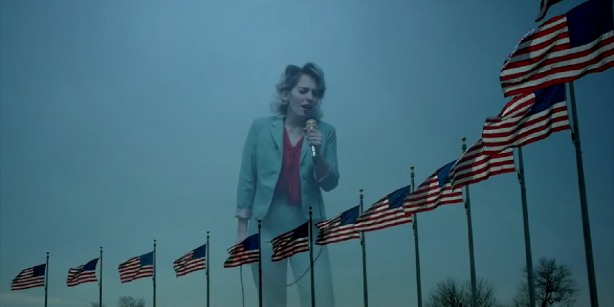 Music
Music
U.S. Girls waves the flag of true colours
by Jesse Locke
April 28, 2015
Sonically and thematically, Meg Remy has a singular voice. While her earliest solo releases as U.S. Girls obfuscated the pop sensibilities in a steely haze of tape hiss, she has emerged from the fog as a bold and powerful force. Remy’s torch burners and bangers — propelled by an instantly recognizable/otherworldly set of pipes — weave a strong thread of feminism with thought-provoking messages and gallows humour. Who else would write anthems to periods and sex workers as well as cover Brandy and Monica?
Since switching citizenships from her hometown of Chicago, Remy has assembled a Toronto wrecking crew of collaborators that includes her husband Slim Twig, avant-beatmaker Onakabazien, and powerhouse drummer Simone TB. Her music has found a home everywhere from Siltbreeze to FatCat to Ben Cook’s Bad Actors Inc. and now made the jump to storied UK label 4AD. There, she joins fellow Canadians Purity Ring and Grimes on a stacked roster of forward thinking artists, yet stands out with her dusted soundworld of soul, R&B, and Madlib-style hip-hop mutations; simultaneously timeless and futuristic.
The first U.S. Girls release for 4AD is “Damn That Valley”, the A-side of a forthcoming 7” sung from the perspective of an outraged war widow. In the clip accompanying this block rockin’ protest song, Remy’s frequent video star LuLu Hazell Turnbull (sister of Slim Twig) shakes her fists at the White House and other Washington monuments in a fit of futility. Tracking down Remy in a rare quiet time, we chatted about her take on personal politics plus characters, covers, and collaborations.
Looking back through your discography, I noticed you’ve been taking on the American war machine for quite a while, dating back to “911 Song” from 2007’s Gravel Days and “Iran Then Iraqognized Her” from 2011’s U.S. Girls on KRAAK. What sorts of messages are you trying to get across, especially with “Damn That Valley”?
“911 Song” is actually based on a dream I had where my boyfriend watched from the street as I screamed from the open window of a burning building (a sign I should have followed). With “Damn That Valley” I wanted to write a political song that contained no facts, that was pure emotion. I hate how we are supposed to remain only fact-based in our arguments about politics and the world. It’s a way to contain us and keep us from reacting. I think more of us need to publicly yell and cry about injustice. You don’t have to know all the dates and names to know that something at its core is just plain wrong. I was at a party last year in Montreal where I got so worked up talking about the world, I started to cry and boy, was that a party killer. And I found that strange. Everyone got so uncomfortable. Why is crying (especially in public) so taboo?
I’ve always been impressed by the way you write from the POV of different characters, with some recent examples including the war widow and the women’s advocate in your short film of the same name. How did you first become interested in that approach?
My whole life I have cherished singer/songwriters and story songs. I remember hitting the age where I started understanding the stories I had been singing for so many years. Like Springsteen’s “The River”… “Oh, I see what happened here with that couple. Geez… imagine that.” It was like peeking into someone’s diary. I think it’s important to remove your focus from yourself as often as possible. To imagine what it would be like if you had been born to different parents, in a different country, in a different year. To put yourself in another’s shoes helps grow your acceptance and love for other humans. You can sympathize and you say “I may not agree with you or this has never happened to me, but I feel for you and get where you’re coming from.” On the subway sometimes I look at all the faces and make up their life stories. The world is nothing but a bunch of stories and I don’t think stories are truths. I am not sure there is any such thing as truth.
What sorts of inspirations and challenges do you feel when slipping into someone else’s shoes?
I don’t think there are many challenges with making up characters and writing from their POV. It’s almost like cheating. There is endless inspiration to pull from in the world. I think it’s harder to tell your own story, to let it all hang out. That’s where it gets challenging. We always want to seem “cool”, never too earnest. Mystery seems to make one immortal while showing your true colours seems close to death. But really, I think it’s the opposite.
Another way you slip into shoes is with your choice of cover songs. Some personal favourites of mine are “I Don’t Have A Mind Of My Own” and “Down In The Boondocks”, but you’ve also done some radical reinventions of Bruce Springsteen and Brandy and Monica. How do you choose your covers, and what sorts of inspirations and challenges do you feel there?
The Brandy and Monica cover was all Onakabazien. I loved “The Boy is Mine” as a teenager and when I heard the beat he made reworking that tune, I was not gonna stand for anyone singing it but me. All the other covers came about in a similar way, because I love those songs and I want people to hear me singing the songs I love. It’s a way for me to be a self-centered super fan and hope people will reach back to the original version and gain some knowledge.
Can you tell me a bit about your collaboration process with Onakabazien? What does he do exactly, and how do the music and words typically come together?
I have been making music with Onakabazien in various forms for the past four years. He played drums on “The Island Song” and made the B-side beat to that single. Working on “The Boy is Mine” together really showed us that we each have a very specific skill set that when combined makes strange modern music. He and I both adore (especially soul and R&B) music so much that I think we speak a common language. A typical collaboration with us consists of Mark giving me a bunch of beats that I then take and demo vocals over. Mark mixes it up, maybe overdubs some siren sounds or washes on static and there it is, a hit. In the past we let the samples stand but we are trying to get away from that. Mark’s new style is recording himself playing a bunch of instruments and then sampling himself. It’s genius and it gives the tracks an indescribable sound. It all feels familiar yet very foreign. And it’s a step up for us in terms of ambition which feels real good.
You have another ongoing collaboration with LuLu Hazel Turnbull. How did you discover she was your muse?
LuLu is an actor who is up for anything. I say “Hey Lu, go shake your fist at the White House” and she does it. Or “Lu, I need you to run up and down this road in your underwear like 10 times while acting like you are in control and then out of control” and she just starts running, perfectly conveying what I asked her to. She is a 100% willing collaborator who is also very smart about people and the world. So she brings a lot to the table. Getting close with LuLu coincided with me starting to make videos so it felt very natural. I predict her and I are going to make things together until one of us stops existing.
Can you offer any kind of sneak peek about your upcoming full-length for 4AD? What sorts of lyrical and musical threads are you weaving these days?
Love and sex, the politics of boredom, taking plastic surgery too far, violence, fear. Everyday sort of stuff, ya know?
Tags: Music, emerging, u.s. girls





